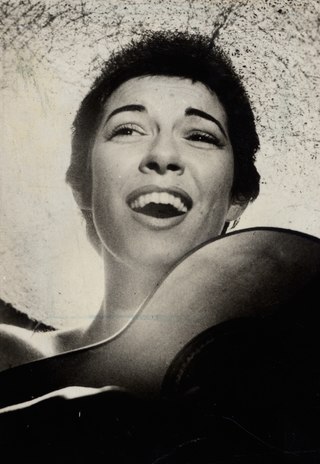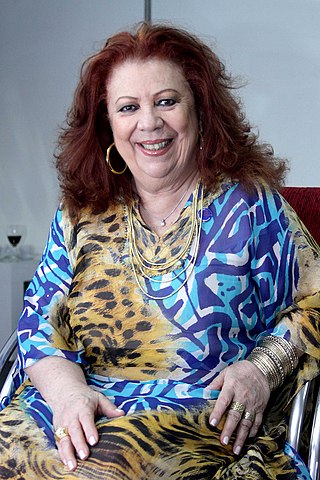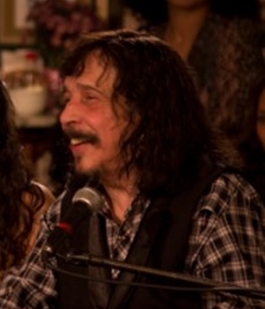
João Bosco de Freitas Mucci, known professionally as João Bosco is a Brazilian singer-songwriter and guitarist. In the 1970s he established his reputation in música popular Brasileira with lyricist Aldir Blanc.

Renato Borghetti is a Brazilian folk musician and composer.

Luiz Carlos dos Santos, widely known by his stage name Luiz Melodia, was a Brazilian singer-songwriter whose music was a characteristic crossover of multiple Music genres including Música popular brasileira (MPB), rock music, blues, soul music and samba. He has been described as 'one of the most important Brazilian-born musicians.'

Ignez Magdalena Aranha de Lima Barroso was a Brazilian sertanejo singer, guitarist, actress, TV presenter, librarian, folklorist and teacher.

César Guerra-Peixe was a Brazilian violinist, composer, and conductor.

Elizabeth "Beth" Santos Leal de Carvalho was a Brazilian samba singer, guitarist, cavaquinist and composer.
The Zimbo Trio is a Brazilian instrumental ensemble, established in 1964 in São Paulo, and originally comprising Amilton Godoy (piano), Luís Chaves (bass) and Rubinho Barsotti (drums). The Trio was one of the most influential groups of Brazilian music in the second half of the 20th century.

Fafá de Belém, born Maria de Fátima Palha de Figueiredo in Belém do Pará on August 9, 1956, is a Brazilian singer considered one of the great female singers of MPB. She took her stage name from the city of her birth and in addition to a successful recording career that spans over three decades, it is fair to say that she has been one of the great sex symbols of Brazilian pop music. Her husky mezzo-soprano voice is known for its extensive emotional range, from tender ballads, to sensual love songs, to Portuguese fados all the way to energetic sambas and lambadas.

Wilson das Neves was a Brazilian percussionist and singer from Rio de Janeiro, Brazil. He was a key figure in the history of Brazilian music, having played with many of Brazil's greatest musicians across many decades and featured on numerous important recordings. Wilson was a very important artist specially for Brazilian popular music as a sambista, composer, and instrumentalist, with over 50 years dedicated to music. He can be heard in over 600 records from major Brazilian artists.

Pro-Música Brasil (PMB), previously Associação Brasileira dos Produtores de Discos (ABPD), is an official representative body of the record labels in the Brazilian phonographic market.

Belchior was a Brazilian singer and composer. He was one of the first MPB singers from the Brazilian northeast to reach mainstream success, in the early 1970s.

Diogo Nogueira is a Brazilian singer and songwriter. He is the son of composer João Nogueira and Ângela Maria Nogueira.

Maria Rosa Canelas, better known as Rosinha de Valença, was a Brazilian composer, arranger and musician. She is considered one of the best acoustic guitarists in Brazilian music and played with many famous artists, including Baden Powell, Sérgio Mendes, Sylvia Telles and Sivuca.

Sandra Cristina Frederico de Sá is a Brazilian singer and songwriter.

MPB4 is a vocal and instrumental Brazilian group formed in Niterói, Rio de Janeiro, in 1965, and has been active since. The group's main genres are sung samba and MPB, and they are considered among the best vocal interpretation group in Brazil. They have frequently collaborated with Quarteto em Cy, Toquinho and Chico Buarque. In 2001, MPB-4 completed a 36-year career with the same formation.

Agostinho dos Santos was a Brazilian singer and composer of bossa nova, MPB and rock and roll, active from the early 1950s until his premature death in the crash of Varig Flight 820 in 1973, at the age of 41.

The albums discography of Brazilian singer-songwriter Ivete Sangalo consists of seven studio albums, three live album, seven compilation albums, one extended play and five video albums. In 1993, Sangalo began her career as lead singer of Banda Eva, the most successful Brazilian axé music band, and released six studio albums, one live album and two compilation albums.

Ao Vivo em Copacabana is the first live album by the Brazilian recording artist Claudia Leitte, released on June 27, 2008. The album was recorded during a single concert performed on February 17, 2008, at Copacabana beach in Rio de Janeiro in front of audiences of up to one million people. The disc had sold over 700,000 copies, which earned her a certified Triple Platinum and Gold Record by ABPD.

Uday Vellozo, with stage name of Benito di Paula, is a Brazilian singer-songwriter, composer, pianist and writer. He is known for his characteristic samba that started when he was young and sang in hotels and nightclubs in Rio de Janeiro, where he did not play a specific genre. Di Paula was invited by a friend to play in Santos, where he led his career in the State of São Paulo.
Katinguelê is a Brazilian pagode and samba group, formed in São Paulo in the first half of the 1980s. They are most well known for their romantic pagode songs as the subgenre began to explode in the 1980s and 1990s.


















